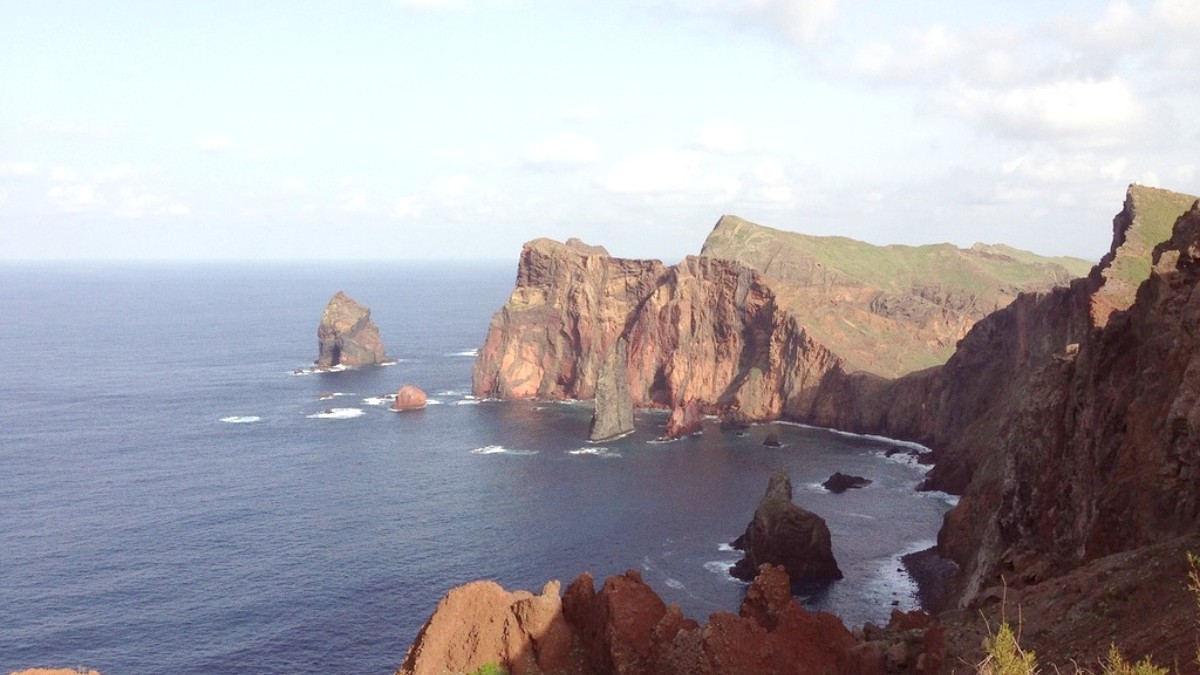
Portugal
Madeira's cuisine originates from Portuguese traditions, with unique characteristics from the island's isolation, volcanic soil, and the Atlantic Ocean. Its past as a significant port introduced various ingredients and spices.
Local produce, fresh fish, and sugarcane products form the foundation of its gastronomy. Terraced fields contribute a variety of fruits and vegetables.
Lunch (almoço) 12:30-14:30. Dinner (jantar) 19:30-22:00, especially weekends. Many restaurants close between lunch and dinner.
Bread, olives, cheese are often placed on the table. These items are charged if consumed. Decline politely if not desired.
Service can be relaxed; enjoy the unhurried pace. Wait to be seated in most restaurants.
Large cubes of beef seasoned with garlic and salt, skewered onto a laurel stick and grilled. Served hanging.
Find in traditional Madeiran restaurants specializing in grilled meats.
Round, flat bread with sweet potato flour, baked on a hot stone, served warm with garlic butter.
A staple, good as a side or for sandwiches (Prego no Bolo do Caco).
Deep-sea black scabbard fish, pan-fried and served with fried banana. A unique combination.
Widely available in seafood restaurants.
Potent alcoholic drink with sugarcane rum, honey, and lemon juice. Many variations.
World-famous fortified wine, from dry to sweet. Visit a wine lodge for tastings.
High-end restaurants, often in luxury hotels, offering sophisticated interpretations of local and international cuisine with elegant ambiance.
Abundant throughout Funchal, with a wide selection of traditional Portuguese and Madeiran dishes, fresh seafood, and grilled meats.
Economical and authentic meals at small cafes (tascas), snack bars (padarias/pastelarias), and market stalls.
Funchal has international restaurants, especially in the Lido tourist zone.
Find Italian, Indian, Chinese, Japanese, and other global cuisines.
While Madeiran cuisine is dominant, options for diverse palates are available.
Hotel restaurants often serve international menus.
The Zona Velha is known for its many traditional eateries.
Many places offer outdoor dining, creating a lively evening ambiance.
Easy to explore on foot, finding your perfect dining spot.
Enjoy the unique painted doors as you stroll.
Carry a Travel phrasebook with dietary phrases like "sem glúten" (without gluten), "sem lacticínios" (without dairy), "sou vegetariano/a" (I am vegetarian).
Clearly communicate with restaurant staff.
Online search platforms, specialized travel apps (HappyCow), and food blogs are good for finding suitable restaurants.
For Halal/Kosher, self-catering with local market produce may be needed, as options are very limited.
"Eu sou vegetariano/vegan." (I am vegetarian/vegan.)
Learn to prepare traditional Madeiran dishes, from appetizers to desserts, in hands-on classes.
Explore Funchal's culinary scene, with visits to the municipal market, local specialties, and poncha bars.
Discover Madeira's agricultural heritage at banana plantations, vineyards, or sugarcane mills.
Poncha is strong! Consume in moderation, especially if planning further activities.
Enjoy responsibly.
Consider purchasing a local cookbook to replicate Madeiran flavors at home.
A great souvenir.
People participating in a cooking class, preparing traditional food in a lively kitchen setting.
The image conveys engagement, learning, and cultural immersion through food.
Directly illustrates the culinary experience of learning local dishes.
For an authentic and budget-friendly meal experience, try the "Prato do Dia" (Dish of the Day) at lunchtime.